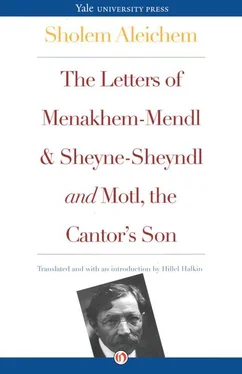In fact, Pinye could make a living like everyone if he didn’t knock his brains out thinking of ways to get rich. (He comes from a brainy family, Pinye does.) He’s kind of making a living already. The trouble is that he goes from dzhahb to dzhahb. You have to hand it to him, though. No dzhahb in the world is beneath him. He’ll do anything he’s asked to earn a dahleh. Tell him to sweep the strit and he’ll sweep the strit. Tell him to shovel coal and he’ll shovel coal. Selling noospeypehz is fine too. America, Pinye says, is a free country. The only dzhahb to be ashamed of is a thief ’s. An American wouldn’t steal a bar of gold if you left it in front of him. He wouldn’t lie or cheat, either. Pinye is sure of that. He’s written a poem about America. I don’t remember it all, but here is some of it:
This country of Columbus
Is a place for every one-’f-us,
The only one that’s giving
Jew a chance to make a living.
From New York City to Seattle
You won’t hear a teapot rattle,
Nor a blahfeh nor a liar
From California to Ohio.
It went on like that and ended:
America’s a country where a person can go far. That’s why it’s got a prehzident and not some stinking tsar.
Elye just laughed and said that “liar” and “Ohio” didn’t rhyme. Pinye said, “Here’s another poem for you. If you know a man named Shmiel, have him over for a meal, and if you know a man named Leyzer, tell him to go to hell. You say Leyzer and hell don’t rhyme? Then he can go to hell without a rhyme!”
In case you’re wondering whether Brokheh and Taybl are making a living too, let me tell you they’re in the necktie biznis. That’s my mother and her synagogue’s doing again. A woman she knows there is an awreitnitshke named Kreyndl. Back in Kasrilevke, Kreyndl was a housemaid who worked for Rich Yosi. That’s a story in itself.
In Kasrilevke lived a butcher named Meylekh who had a young assistant, Nekhemye. This Nekhemye fell in love with our Kreyndl and wanted to marry her. He just didn’t have with what. And so he hit on a scheme. The next time Meylekh the butcher sent him to the fair to buy a cow, he took the money and Kreyndl and lit out for America. He’s done pretty well here and now he’s an awreitnik with a tie factory.
It so happened that Kreyndl the awreitnitshke had a memorial day for her mother and struck up an acquaintance with my mother in the Kasrilevke shul. When she heard my mother was Peysi the cantor’s widow, she offered to help. My mother said the only help she needed was work for her children. Well, one thing led to another and pretty soon the awreitnitshke talked to the awreitnik and got Brokheh and Taybl dzhahbz in his fektri. It’s up on Brawdvey. After they had worked there for a while, my mother used her influence and they were allowed to take home piecework instead.
It didn’t last very long. Brokheh and Taybl kept busy until the end of the sizn. Then came slekteim and they were out of work. We tried not to let it get us down. As my mother says, “God is a father. He punishes with one hand and heals with the other.”
That’s something I don’t get. Why punish and then heal? You could save yourself the trouble by skipping both.
My mother also says, “God sends the cure with the ailment.”
I’ll tell you what she’s thinking of. Just let me stop to catch my breath.
It’s like this.
My brother Elye has quit working for Hibru Neshnel Delikatesn. It wasn’t a job for him. He’s Peysi the cantor’s son, remember? He’s well bred and has a good voice. In fact, he’d make a fine cantor himself. What kind of job is bringing people haht dawgz?
Bringing haht dawgz is no disgrace. But there are all kinds of people in the world. Some are well bred themselves. You take a young man from a good home — he orders his haht dawgz, eats them quietly, pays the bill, and bei-bei.
But not everyone comes from a good home. Sometimes you get a rude moron who makes you sizzle. His haht dawgz aren’t hot enough. Or else you’ve forgotten the mustard. And he doesn’t say, “Excuse me, please, I’d like another awdeh.” He whistles or snaps his fingers and shouts, “Hey, vaydeh! Maw dawgz!”
Elye isn’t used to such language. He loses his temper and refuses to answer. The moron doesn’t like that and shouts louder, “Hey, professor! Come over here!”
“Since when am I a professor to you?” Elye asks.
That causes the moron to shout so loud that the bawss comes running and says to Elye: “Vahts deh meddeh vid yu?” Elye doesn’t answer him either. “I’m asking you a question,” says the bawss. “Ask me proper and you’ll get an answer,” Elye says. “What’s proper by you?” asks the bawss. “Proper is Jewish,” Elye says. “And talking English makes me a monster?” asks the bawss. “It might,” Elye says.
“In that case,” says the bawss, “I’m giving you the sek. In proper Jewish, you can stay in bed tomorrow.”
“I’d rather starve than sell haht dawgz.”
That’s what my brother Elye says. Pinye disagrees. America, he says, is a free country. You need to take things in stride.
Don’t argue with Pinye unless you want to hear about his millionaires. I mean Kahnegi, Rahknfelleh, and Vendehbilt. Elye asks:
“What makes you think you know all about them?”
“What makes me think I know all about the Tsar?” Pinye answers.
“All right, what makes you think you do?”
“If you read as many novels as I have,” Pinye says, “you’d know all about him too.”
Novels are the books that Pinye reads at Moyshe’s stend. Although they’re written in a plain, simple Jewish, they’re harder to understand than the Bible. Moyshe lends them out. He makes a living from it. One book can have a hundred readers. Most are women. Women are crazy about novels. On Saturday mornings Brokheh gobbles them up like hotcakes. My mother and Taybl listen to her read out loud. My mother falls asleep and Taybl sits there sighing. Sometimes she bursts into tears. She has a tender heart, Taybl does. If I were allowed to draw on the Sabbath, I’d sketch Brokheh reading while my mother sleeps and Taybl cries.
But here I am talking and I still haven’t told you about God’s cure!
First, though, let me tell you about the ailment. It’s no joke for a young man like Elye to be out of work. Elye isn’t Pinye. If Pinye needs money, he’ll take a shovel and shovel snow. Elye says he would shovel it too, but not in the strit. “I suppose you’re waiting for a home delivery,” Pinye says. Elye gets sore and answers:
“I can see you’re in a grand mood.”
“Of course I am. I’m in a grand mood every time I remember I’m in America and not in Pogromland.”
“Your great-grandmother must be thrilled,” Elye says. He’s so depressed he decides to go to synagogue.
And that’s where God sends his cure, right there in the Kasrilevke shul. Listen to this.
I’ve told you how, the same summer we were walking the streets of Vaytshepl, there was a whale of a pogrom in Kasrilevke, plus a fire in the bargain. The hooligans stole all they could, smashed what they couldn’t, and burned what they couldn’t smash. It wasn’t so bad if you were poor. What did you have to lose apart from a few pillows? In fact, you thanked God if you were still in one piece, because not everyone was. Little children were torn limb from limb or left to die of hunger. That’s if you were poor.
But the rich! One day you’re rolling in clover and the next you’re a beggar without a shirt on your back. Just thinking of it can send a chill down your spine, that’s what our Kasrilevke Jews say.
There’s only one thing I don’t get. How come no one gets a chill thinking of the poor people and their children being torn apart? My friend Mendl doesn’t get it either. That’s how our Kasrilevke Jews are, he says. Let a poor Jew die of hunger and it’s nothing. Let a rich Jew become a poor Jew and it’s the end of the world.
Читать дальше












